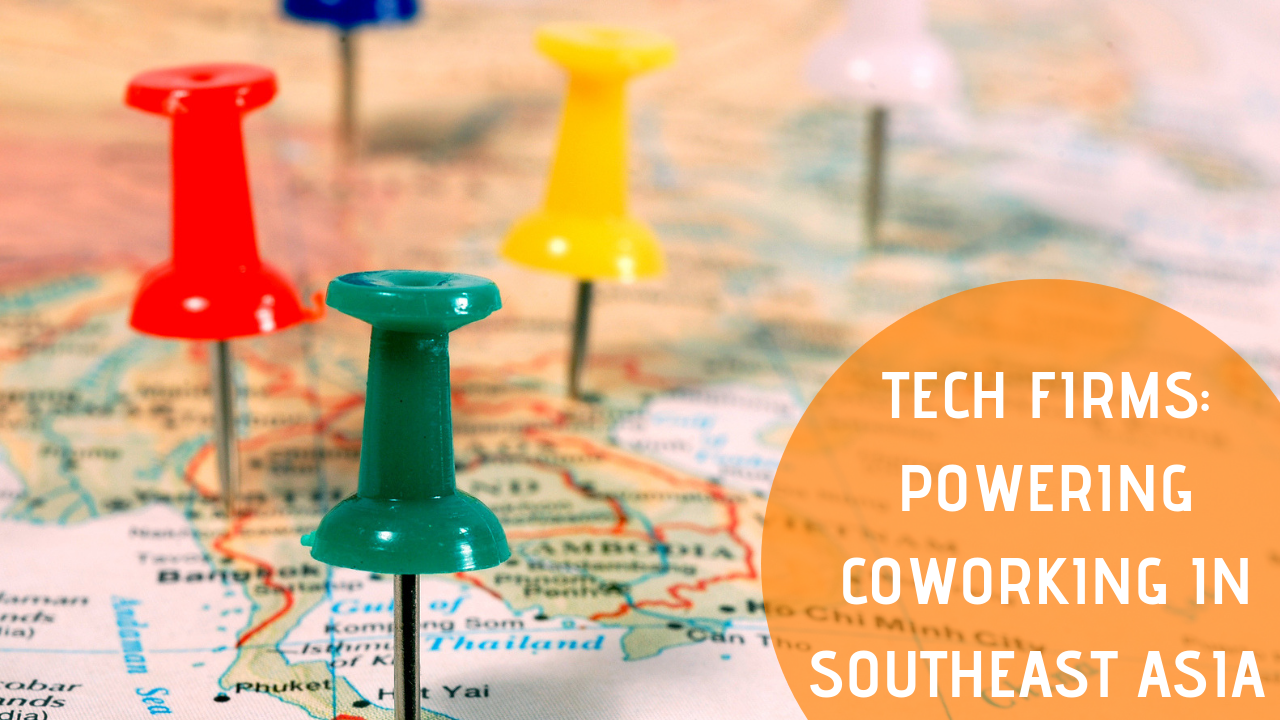- Tech companies and coworking spaces are increasingly dominant office occupiers.
- WeWork “likely” to have a presence in six Southeast Asia cities in the next year.
- Local and international coworking operators are ready to battle for the region’s market share.
Technology companies are now a major office occupier in Southeast Asia and the demand for flexible and coworking spaces will continue to grow at an increasing rate in the region.
Research reveals tech businesses take up 15-20% of total gross office leasing volume in Southeast Asia, compared to just 5-10% three years ago. A recent JLL report reveals flexible workspaces have grown by circa 40% CAGR in the last three years and now take up 2% of the office stock, up from 0.5 to 1.0% in 2015.
JLL predicts that as much as 30% of corporate portfolios in the Southeast Asia region could be flexible space by 2030. The report states: “What initially began as a platform for freelancers and startups, flexible space providers are now tailoring their offering to accommodate corporate users. These corporate users are experimenting with coworking via pilot schemes.”
This trend is indicative of the wider coworking market – where corporates are experimenting with and often embracing flexible workspaces. If tech firms are dominating in the Southeast Asia region, then it seems natural that these businesses will lead the corporate coworking revolution.
Alibaba, Facebook, Google, WeWork, and Singapore-based Sea, which operates Garena gaming and esports platform and Shopee e-commerce site, are named by JLL as the top five technology companies with the largest footprint in Southeast Asia.
The majority of these tech companies have moved into the coworking arena in some form or another already. Facebook and Alibaba recently started using coworking models – and Google’s Campus model is a well-established space for tech startups.
While WeWork’s categorisation as a technology company may raise a few eyebrows, the coworking operator has made its expansion intentions in Southeast Asia very clear – with a reported $500 million investment for the region announced in 2017 and its Spacemob acquisition in August 2017.
WeWork opened its first space in the region in Singapore earlier this year with further spaces now available in Malaysia, the Philippines, Thailand and Vietnam.
The Technology Firms Transforming the Office Landscape in Southeast Asia report states: “While Regus has a large presence in Singapore, WeWork has been expanding rapidly across Southeast Asia in the last year. Based on their expansion track record globally, we think WeWork is likely to have a presence in most of the six Southeast Asia cities within the coming 12 months. In addition, the company is likely to grow in the number of locations within each city as well.”
Local talent
WeWork is not the only major coworking player eyeing up the Southeast Asia market. WeWork’s coworking space rival in China Ucommune reportedly acquired competitor Fountown for an undisclosed amount this month. Fountown operates 26 coworking offices in Beijing and Shanghai, which would bring Ucommune’s offices in Beijing to 88 and in Shanghai to 42, according to the South China Morning Post.
China-based coworking space startup naked Hub hopes to enter the Singapore market and to open locations in Jakarta, Kuala Lumpur, Bangkok, and Manila; either via partnerships, mergers, or acquisitions, according to reports from Reuters.
Coworking operator JustCo also launched in Singapore in 2015 and recently announced plans to expand into premium premises in Bangkok earlier this year.
The JLL report also highlights local development efforts for flexible workspaces in four key locales in Southeast Asia, including Singapore, Jakarta, Kuala Lumpur and Vietnam. “A key sign that flexible spaces and coworking will be a permanent feature of corporate portfolios is the investment by developers into the sector across Southeast Asia,” according to the report.
Most local developers have invested or formed joint ventures with flexible space operators in these regions. Coworking operators are also forming strategic partnerships with developers to create workspaces in more locations.
It’s clear that the coworking market in Southeast Asia is on the brink of major expansion. What is less clear is whether local or international operators will dominate in this burgeoning space.
The role technology firms will play when shaping the region’s corporate coworking industry is also an unknown quantity and one that could add a very interesting dynamic to Southeast Asia’s future coworking scene.



 Dr. Gleb Tsipursky – The Office Whisperer
Dr. Gleb Tsipursky – The Office Whisperer Nirit Cohen – WorkFutures
Nirit Cohen – WorkFutures Angela Howard – Culture Expert
Angela Howard – Culture Expert Drew Jones – Design & Innovation
Drew Jones – Design & Innovation Jonathan Price – CRE & Flex Expert
Jonathan Price – CRE & Flex Expert












